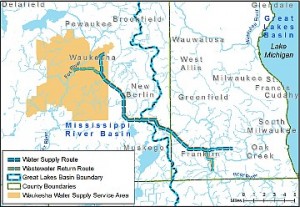This week the City of Waukesha celebrates the success of an impressive technical effort 13 years in the making. After inserting some final conditions, the Great Lakes Compact Council unanimously approved Waukesha’s application to divert water from Lake Michigan for its public supply. The application has generated significant regional and national interest because of its status as a “test case” for the Great Lakes Compact. The Compact generally bans diversions of Great Lakes water outside the Great Lakes basin, but offers limited exceptions for communities that straddle the basin  line, or that lie within counties that straddle the basin line, provided a community’s application meets certain stringent technical conditions. Waukesha is the first community wholly outside the Great Lakes basin to apply for a diversion (though not the first community to receive a diversion; New Berlin, which straddles the basin line, successfully achieved that distinction in 2009). As I have written previously in this space, the Waukesha case has been a striking demonstration that the process set up under the Compact works, no matter what one’s position on the outcome.
line, or that lie within counties that straddle the basin line, provided a community’s application meets certain stringent technical conditions. Waukesha is the first community wholly outside the Great Lakes basin to apply for a diversion (though not the first community to receive a diversion; New Berlin, which straddles the basin line, successfully achieved that distinction in 2009). As I have written previously in this space, the Waukesha case has been a striking demonstration that the process set up under the Compact works, no matter what one’s position on the outcome.
Yet from a legal perspective, that process may not be complete. The technical review and approval challenge remains subject to legal challenges. One vehicle for such a challenge is the Compact itself. It contains a “dispute resolution and enforcement” provision that offers redress to “any person aggrieved” by an action of the Compact Council or of a party to the Compact. The provision offers a glimpse of a legal process that may be just as complex as the technical approval process just completed.
In the event of a challenge, the first issue may be the plaintiff’s standing to contest the decision. This is a notoriously complex question in environmental cases, often requiring the showing of a “particularized injury,” or in the terms of the Compact, that the plaintiff is “aggrieved.” Assuming that a challenger can clear that hurdle, the Compact allows two potential courses of action:
- A person aggrieved by the Council’s action is entitled to a hearing before the council followed by an appeal to federal district court.
- A person aggrieved by a party’s action is entitled to an administrative hearing pursuant to the party’s administrative procedures and laws, followed by an appeal to the party’s court of competent jurisdiction.
Of course, this hints at the possibility of multiple actions proceeding simultaneously in different forums, depending on whether the challenge is to an action by a party, the Council, or both. Moreover, that litigation would be extraordinarily complex; for example, it would require courts to delve into the massive technical filings to determine whether Waukesha had a “reasonable water supply alternative,” see Wis. Stat. § 281.343(4n)(c)1.d; whether Waukesha’s need could have been “reasonably avoided through the efficient use and conservation of existing water supplies,” see Wis. Stat. § 281.343(4n)(d)1; and whether the diversion “will result in no significant individual or cumulative adverse impacts to . . . the basin with consideration given to the potential cumulative impacts of any precedent-setting consequences associated with the proposal,” see Wis. Stat. § 281.343(4n)d.4. These would be difficult questions, to put it mildly.
Nor is it clear whether a court would accord any deference to the determinations reached by the parties, individually, and by the Council, collectively. As I wrote in another post, the ground rules for deference may be changing even for well-established federal and state agencies, let alone relatively new entities like the Council.
At this point, it is impossible to know whether any group will challenge the Council’s determination. Waukesha mayor Shawn Reilly believes a challenge is unlikely, but application opponents are reportedly mulling their options. If opponents do file suit, we’ll have another “test case” under the Compact – this one from the legal side.
